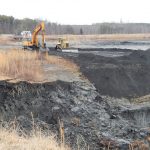Front Porch Blog
Updates from Appalachia

Criminal charges filed against Duke Energy
 The U.S. Department of Justice has filed criminal charges against Duke Energy for violating the federal Clean Water Act at coal ash sites across North Carolina. The company announced today that it has reached a plea agreement with federal prosecutors to resolve the charges that includes $102.2 million for fines and mitigation.
The U.S. Department of Justice has filed criminal charges against Duke Energy for violating the federal Clean Water Act at coal ash sites across North Carolina. The company announced today that it has reached a plea agreement with federal prosecutors to resolve the charges that includes $102.2 million for fines and mitigation.
“Clean coal” is on the fritz
 From The Appalachian Voice Online: As one of the most high-profile and hyped-up projects of its kind, the FutureGen “clean coal” plant in Illinois was supposed make history. So the announcement that the U.S. Department of Energy is backing out of its $1.1 billion funding promise to the project sent a shockwave through the coal sector and investors, energy analysts and environmentalists all took note.
From The Appalachian Voice Online: As one of the most high-profile and hyped-up projects of its kind, the FutureGen “clean coal” plant in Illinois was supposed make history. So the announcement that the U.S. Department of Energy is backing out of its $1.1 billion funding promise to the project sent a shockwave through the coal sector and investors, energy analysts and environmentalists all took note.
Meet Zack Dixon, grand prize winner of the home energy makeover contest
 Zach Dixon, a resident of Boone, N.C., and the grand prize winner of Appalachian Voices’ High Country Home Energy Makeover Contest heats his house with space heaters, and chronically struggles to pay his electricity bills. With help from many partners around the High Country, we’re working to change that.
Zach Dixon, a resident of Boone, N.C., and the grand prize winner of Appalachian Voices’ High Country Home Energy Makeover Contest heats his house with space heaters, and chronically struggles to pay his electricity bills. With help from many partners around the High Country, we’re working to change that.
Danger still looms over the Dan River
 In the wake of the Dan River coal ash spill, which spewed 39,000 tons of the toxic waste into the scenic river, much attention has been given to the problems of leaky, unlined coal ash pits across North Carolina. What hasn’t received adequate attention is another menacing threat just upstream from the site of last year’s spill.
In the wake of the Dan River coal ash spill, which spewed 39,000 tons of the toxic waste into the scenic river, much attention has been given to the problems of leaky, unlined coal ash pits across North Carolina. What hasn’t received adequate attention is another menacing threat just upstream from the site of last year’s spill.
The will against poverty: ASU students serve in rural Appalachia

Jan. 19 marked the twentieth year since President Clinton passed legislation to encourage Americans to volunteer on Martin Luther King Jr. Day. Appalachian State University has recognized the day the with the MLK Challenge for sixteen years. Having participated in the challenge as a student, I couldn’t help but want to participate again. But I never knew I would be spelunking in a dusty crawlspace.

